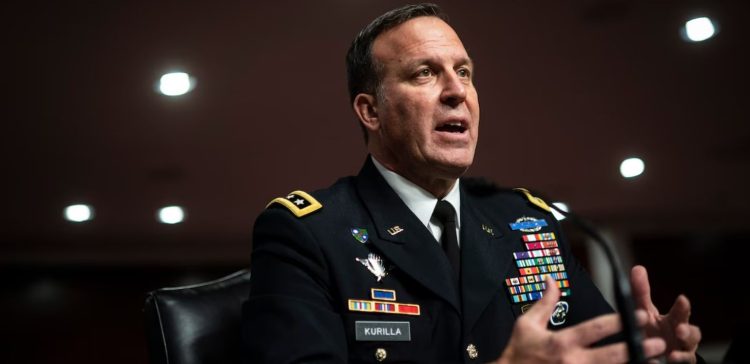In a surprising turn of events, U.S. Central Command (CENTCOM) Commander General Michael “Erik” Kurilla is reportedly under investigation by the Army’s Criminal Investigation Division (CID) for an alleged physical altercation involving an airman. The incident, which purportedly involved Kurilla shoving the airman, has sparked a flurry of questions regarding conduct and discipline within the upper ranks of military leadership.
CID is being tight-lipped and will acknowledge only that they are “aware of an alleged incident and are currently looking into it.”
The Alleged Incident: What Happened?
While details are still emerging, sources close to the situation report that General Kurilla allegedly confronted an airman during a recent base visit. According to a recent report on military.com, the General allegedly “put his hands on an airman during a C-17 Globemaster III flight on a trip to Israel”. This was reportedly after Kurilla became upset after an argument with one of the flight crew.
The exact specifics of what led to the alleged altercation remain unclear. Some reports suggest that the disagreement may have stemmed from a heated exchange regarding the airman’s conduct or duties. Others speculate it could have been part of a broader tension-filled encounter, though these details are still unconfirmed.
For CENTCOM personnel and those familiar with the culture of discipline in the military, such incidents involving senior leaders are exceptionally rare and typically attract significant scrutiny. Physical altercations, even minor ones, are held to the highest standards of accountability, especially among senior officers who set the example for discipline and conduct.
General Kurilla’s Background and Leadership Style
General Kurilla, a highly respected and decorated leader with decades of experience in special operations, has long been known for his direct approach and commitment to military standards. Rising through the ranks in a career marked by multiple deployments to Iraq and Afghanistan, Kurilla has a reputation as a leader who isn’t afraid to speak his mind and hold people accountable, sometimes in unfiltered terms. He has been awarded the Bronze Star for valor, as well as two Purple Hearts for injuries sustained in combat operations in Iraq.
However, it’s also this tough-as-nails leadership style that has garnered a mix of respect and criticism over the years. In the high-stakes environment of CENTCOM, where difficult decisions must often be made under pressure, Kurilla’s direct approach has helped him navigate complex operational challenges across some of the most volatile regions in the world. But this recent incident, if proven true, could place a significant blemish on his distinguished career.
The Investigation and Potential Consequences
The investigation into General Kurilla’s conduct is being handled with the utmost discretion, as is typical with matters involving senior officers. Military investigations of this nature are carried out under strict protocols to ensure an unbiased examination of the facts.
The outcome could range from a formal reprimand to more severe disciplinary action, depending on the investigation’s findings. For Kurilla, a reprimand would be a serious mark against a long and respected career, particularly as he holds one of the highest commands in the U.S. military. In the worst-case scenario, more severe consequences could impact his current role and even his future within the military.
Larger Implications for Military Leadership
This incident has raised broader questions about the standards of conduct expected of leaders in the military. For many in the armed forces, especially younger service members, this investigation might serve as a litmus test for how discipline is applied across ranks. The outcome could shape perceptions of whether senior leaders are held to the same level of accountability expected of lower ranks.
In recent years, the military has taken steps to emphasize respect, inclusion, and professional conduct among all personnel. If this incident were swept under the rug, it would risk undermining those initiatives and damaging trust within the ranks. On the other hand, a thorough and fair investigation would reaffirm the military’s commitment to accountability, irrespective of rank.
Moving Forward
General Kurilla’s future remains uncertain as the investigation unfolds. For now, he continues to lead CENTCOM, overseeing vital military operations in some of the world’s most challenging regions. His role requires an extreme level of focus and resilience, both of which may be tested as he navigates this personal and professional challenge.
The investigation into General Kurilla will undoubtedly be watched closely by both military personnel and the public. As one of the military’s most influential figures, his case will not only affect his career but could also influence how the armed forces approach issues of leadership accountability moving forward.
The outcome, whatever it ends up to be, will serve as a powerful reminder that in the military, actions at every level—whether on the battlefield or in day-to-day interactions—are held to the highest standards of conduct and accountability.
This is a developing story, and as more details become available, SOFREP will bring them to you.










COMMENTS